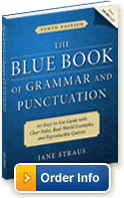|
Hi, Friend.
Welcome to your GrammarBook.com E-Newsletter.

"Thank you very much for sending me these grammar lessons."
- Olive L.
"I have been exploring your site and would like to say how much I like it. I like the clean and uncluttered look, and the content is wonderful."
- Helen M.
"Your Web site is amazing! I've spent a bit of time on the quizzes, and have been impressed."
- Kerri M.
"I cannot tell you how much I enjoy reading what I consider to be the 'grammar bible.'"
- Mary M.
|
|
|
Some Confusing Words
We have many words in the English language that have subtle differences between them. If you know these differences, you will be confident that you are conveying the meaning you intend.
The five sets of confusing words we will cover today are:
- Adverse vs. Averse
- Uninterested vs. Disinterested
- Suppose vs. Supposed
- Oriented vs. Orientated
- Democratic Party vs. Democrat Party
Adverse vs. Averse
Adverse = unfavorable or antagonistic in purpose or effect; strongly opposed (refers to things, not people)
Averse = having repugnance (refers to people)
Example: She had an adverse reaction to the medication.
Example: They experienced adverse weather conditions.
Example: He is averse to a military draft.
Uninterested vs. Disinterested
Uninterested = not interested
Disinterested = unbiased
Example: She seemed uninterested in history.
Example: Because she was disinterested, she acted as the mediator.
Suppose vs. Supposed
Suppose = to assume to be real or true; to consider as a suggestion
Supposed = intended; required; firmly believed; permitted
Example: I suppose you will tell me when it’s time for dinner.
Example: Suppose we go to the movie now…will that work for your schedule?
Example: We were supposed to meet at the theater.
Example: He is supposed to be at work at 6:00 P.M.
Oriented vs. Orientated
The dictionary allows you to use either word to mean “adjusted or located in relation to surroundings or circumstances.”
Example: The house had its large windows oriented toward the ocean view.
Example: The house had its large windows orientated toward the ocean view.
Democratic Party vs. Democrat Party
It’s the Democratic Party. Some non-Democrats don’t like the implication that one party has a lock on democratic principles so will say Democrat Party.
Due to the E-Newsletter's large readership, we are unable to respond to individual English usage questions. |
|
Free BONUS Quiz For You!
Friend, because you are a subscriber to the newsletter, you get access to one of the Subscription Members-Only Quizzes. Click here to take a Confusing Words and Homonyms Quiz and get your scores and explanations instantly!

"So convenient...hundreds of quizzes in one click."
Friend, Subscribe to receive hundreds of English usage quizzes not found anywhere else!
- Take the quizzes online or download and copy them.
- Get scored instantly.
- Find explanations for every quiz answer.
- Reproduce the quizzes to your heart's content.
- EASY to use.
- No software to download.
- No setup time.
- A real person to help you if you have any questions!
"Fun to test my skills!" "The explanations really help...thanks!"
Your choice: Subscribe at the $29.95 or $99.95 level ($30 off - regularly $129.95).
"I download the quizzes for my students who don't have computer access."
Subscribe today to receive hundreds of English usage quizzes not found anywhere else!
"Makes learning English FUN!"
 |
Don't need all the quizzes at once?
You can now purchase the same quizzes individually for ONLY 99¢ each. Purchase yours here. |

Get Yours Today!
Get Amazon’s #1 Bestseller in Four Categories!
#1 in Grammar
#1 in Reading
#1 in Lesson Planning
#1 in Vocabulary |
The Blue Book of Grammar
and Punctuation by Jane Straus
An indispensable tool for busy professionals, teachers, students, homeschool families, editors, writers, and proofreaders.
Now available in print AND as an e-Book! Over 2000 copies are purchased every month!
Order Your Copy Today!
- Hundreds of Grammar, Punctuation, Capitalization, and Usage Rules
- Real-World Examples
- Spelling / Vocabulary / Confusing Words
- Quizzes with Answers
|
View the entire contents online
Discounts available for schools, bookstores, and multiple copies. Order Today!
Wordplay
 Fisherman A: Have you ever seen a catfish?
Fisherman A: Have you ever seen a catfish?
Fisherman B: No, how does it hold the rod?
Question: When were there only three vowels in the English alphabet?
Answer: Before you and I were born.
Question: Why did the tomato blush?
Answer: Because he saw the salad dressing.
Learn all about who and whom, affect and effect, subjects and verbs, adjectives and adverbs, commas, semicolons, quotation marks, and much more by just sitting back and enjoying these easy-to-follow lessons. Tell your colleagues (and boss), children, teachers, and friends. Click here to watch.
|